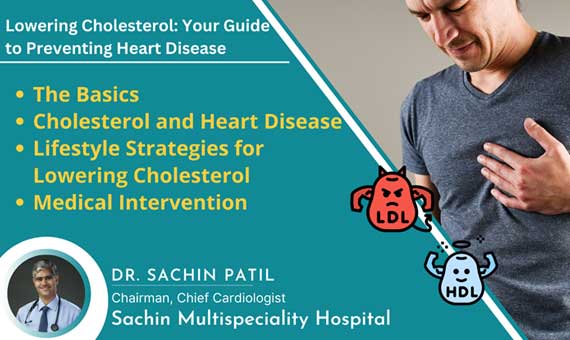
Blog
Lowering Cholesterol (Guide to Preventing Heart Disease)
Lowering Cholesterol : Your Comprehensive Guide to Preventing Heart Disease
Overview
Heart disease remains one of the leading causes of death globally, with high cholesterol levels being a significant risk factor. However, the good news is that you have the power to take control of your heart health by managing your cholesterol levels. This comprehensive guide will walk you through the importance of cholesterol, its impact on heart disease, and effective strategies for lowering cholesterol and preventing heart disease.

Understanding Cholesterol : The Basics
Cholesterol is a waxy substance found in the cells of your body. It plays a crucial role in building cell membranes and producing hormones. However, too much cholesterol in your bloodstream, particularly low-density lipoprotein (LDL) cholesterol often referred to as "bad" cholesterol, can lead to the buildup of plaque in your arteries, increasing the risk of heart disease.
The Connection Between Cholesterol and Heart Disease
Excess LDL cholesterol can accumulate in your arteries, leading to a condition called atherosclerosis, where plaque builds up and narrows the arteries. This narrowing restricts blood flow, potentially leading to heart attacks, strokes, and other cardiovascular issues. High-density lipoprotein (HDL) cholesterol, often termed "good" cholesterol, helps remove excess cholesterol from the arteries, offering a protective effect.
Lifestyle Strategies for Lowering Cholesterol
Heart-Healthy Diet :
- Embrace a diet rich in fruits, vegetables, whole grains, lean proteins, and healthy fats like those found in avocados, nuts, and olive oil.
- Minimize saturated fats and trans fats found in fried foods, processed snacks, and fatty cuts of meat.
- Opt for lean protein sources like fish, skinless poultry, and plant-based proteins.
- Increase fiber intake, as soluble fiber helps reduce LDL cholesterol levels. Oats, legumes, and fruits are excellent sources of soluble fiber.
Regular Physical Activity :
- Aim for at least 150 minutes of moderate-intensity aerobic activity or 75 minutes of vigorous-intensity activity per week.
- Exercise helps increase HDL cholesterol levels and improve overall cardiovascular health.
Maintain a Healthy Weight :
- Losing excess weight can positively impact your cholesterol levels.
- A balanced diet and regular exercise are key components of weight management.
Quit Smoking :
- Smoking damages blood vessels and lowers HDL cholesterol levels.
- Quitting smoking has immediate and long-term benefits for your heart health.
Limit Alcohol Consumption :
- If you choose to drink, do so in moderation. For men, this means up to two drinks per day, and for women, one drink per day.
Medical Interventions and Medications
In some cases, lifestyle changes alone may not be sufficient to lower cholesterol levels. Your healthcare provider might recommend medications such as statins, which help lower LDL cholesterol. It's important to discuss the potential benefits and risks of medications with your doctor.


